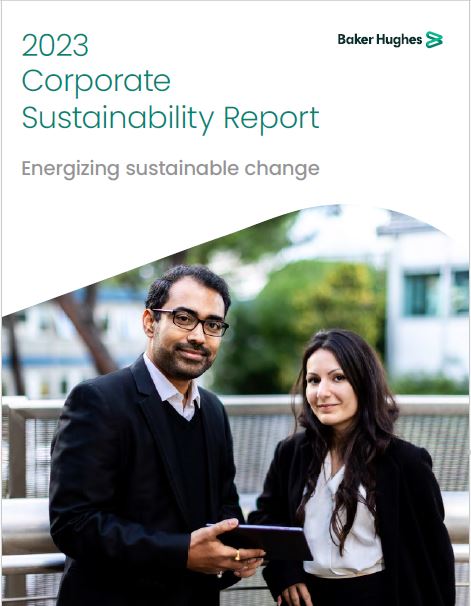Report: Baker Hughes Tapped Zero-carbon Sources for Nearly One-third of Electricity Use in 2023, Reduced Emissions 28.3% from Baseline
Baker Hughes released its 2023 corporate sustainability report, showcasing a notable reduction in Scope 1 and 2 emissions by 28.3% from the 2019 baseline. The company also reported that nearly one-third (29.8%) of its electricity usage came from zero-carbon sources. The report highlights the development of a roadmap for Scope 3 emissions reduction, driven by the employee-led Carbon Out program.
The company spent $410 million to support diverse and small businesses and saw a 43.7% increase in total employee volunteer hours. Additionally, Baker Hughes quantified its product emissions by conducting over 300 life cycle assessments, a 600% increase from last year.
Achievements in Diversity, Equity, and Inclusion (DEI) include a 0.4% increase in women employees and a rise in representation of people of color by 2.2%. The company also reported a 34.5% increase in Health, Safety, and Environment (HSE) observations, with a 16.2% increase in HSE training hours for employees. Baker Hughes remains committed to achieving its operational emissions reduction goal of 50% by 2030 and net-zero by 2050.
- 28.3% reduction in Scope 1 and 2 emissions from 2019 baseline.
- 29.8% of electricity usage sourced from zero-carbon sources.
- Development of Scope 3 emissions reduction roadmap.
- Employee-led Carbon Out program aimed at reducing emissions.
- Spent $410 million supporting diverse and small businesses.
- 43.7% increase in total employee volunteer hours.
- Conducted over 300 life cycle assessments for product emissions.
- 0.4% increase in women employees.
- 2.2% increase in representation of people of color.
- 34.5% increase in Health, Safety, and Environment observations.
- 16.2% increase in HSE training hours for employees.
- Commitment to reduce operational emissions by 50% by 2030 and achieve net-zero by 2050.
- No financial performance data provided in the report.
- Only a slight increase (0.4%) in women employees, which might be seen as insufficient progress.
- No specific figures on cost savings or financial benefits from sustainability initiatives.
- Unspecified figures for the potential costs associated with achieving net-zero goals.
Insights
Baker Hughes has achieved a significant reduction in its Scope 1 and 2 emissions, reducing them by
The enhancement in quantifying emissions footprints through lifecycle assessments is also a positive sign. The completion of over 300 such assessments indicates that Baker Hughes is serious about transparency and accountability. For retail investors, this level of detail in emissions tracking can provide confidence in the company’s genuine commitment to sustainability.
The financial implications of Baker Hughes' sustainability initiatives are multifaceted. On one hand, the capital investment required for such a substantial emissions reduction and transition towards zero-carbon electricity likely incurs considerable upfront costs. However, these initiatives can lead to cost savings in the long run through improved energy efficiency and potential avoidance of future carbon taxes or penalties.
Moreover, the allocation of
Baker Hughes' comprehensive sustainability strategy could serve as a differentiator in the competitive energy technology market. The company's initiatives align with the increasing demand from customers and regulators for sustainable practices. By positioning itself as a leader in sustainability, Baker Hughes can attract new clients who are looking to partner with environmentally responsible companies.
Furthermore, the company’s commitment to achieving net-zero emissions by 2050 and setting intermediate goals for 2030 can provide long-term strategic value. These commitments are often seen as a risk mitigation strategy against regulatory changes and market shifts towards greener technologies. For investors, this could translate into enhanced resilience and stability in the company's future earnings.
NORTHAMPTON, MA / ACCESSWIRE / May 15, 2024 / Baker Hughes:
- Company's 2023 corporate sustainability report announces development of Scope 3 emissions reduction roadmap, operationalized through its employee-driven emissions reduction Carbon Out program
- Increased diversity and inclusion efforts saw
$410 million spent to support diverse and small businesses, and an increase of43.7% in total employee volunteer hours compared to 2022
Baker Hughes (NASDAQ: BKR), an energy technology company, released its 2023 corporate sustainability report Wednesday, outlining progress in advancing sustainability through improved performance in its environmental, social and governance (ESG) metrics. Specifically, the Company reported a reduction of Scope 1 and 2 emissions by
"We are driving transformative and meaningful change to address the urgency and scale required for a sustainable energy development that balances the needs of today, with the needs of the future," Baker Hughes Chairman and CEO Lorenzo Simonelli said. "That change starts with us, and I am proud of our progress in 2023. By leveraging sustainable practices, we have reduced carbon intensity of our operations, while enabling our customers and partners to meet their sustainability goals using our low-carbon and new energy solutions. Sustainability is a key differentiating capability for Baker Hughes and remains critical to our purpose of taking energy forward."
"At Baker Hughes, sustainability is directly tied to our corporate strategy and creates long-term value through improved ESG performance and better resilience against climate risks. Through our sustainability strategy - executed across our corporate framework of people, planet, and principles - we have continued to operationalize sustainability, turning our net-zero ambitions into actions," said Baker Hughes Chief Sustainability Officer Allyson Anderson Book. "Our people remain central contributors to taking energy forward, and I am particularly excited about our employee-driven initiatives like Carbon Out through which we are empowering our 58,000 employees to advance sustainability."
Key highlights of Baker Hughes' sustainability performance in 2023 include:
- Absolute emissions reduction of
28.3% in Scope 1 and Scope 2 greenhouse gas emissions compared to 2019 baseline year: In 2023, Baker Hughes achieved Scope 1 and 2 emissions reductions through operational efficiency, energy efficiency initiatives, fleet electrification, and increased electricity from renewable and zero-carbon sources. Additionally,29.8% of its electricity came from zero-carbon sources. - Quantified emissions footprint of its products: The Company advanced its emissions reductions journey by quantifying emissions throughout lifecycle stages of its products and incorporating the data into product development process. It reported completing over 300 life cycle assessments - over a
600% increase from last year - which allows for a transparent and granular view on carbon emissions of its products. - Scope 3 emissions roadmap: In 2023, Baker Hughes committed to an internal Scope 3 goal and created an emissions reductions roadmap to identify strategic levers to accelerate Scope 3 emissions reductions across all categories. Through its Carbon Out program - a unique, internal company-wide initiative to take carbon out of its operations - the Company has focused on categories with highest emissions footprints and is providing tools, training, and resources for employees to drive down Scope 3 emissions.
- Improvement in Diversity, Equity, and Inclusion (DEI) performance: The Company has released its annual DEI report concurrently, which highlights progress in each of its five DEI strategic goals of diverse workforce, inclusive culture, supplier diversity, customer relationships, and community partnerships. In 2023, women employees increased by
0.4% (year on year) to19.5% , women in STEM background increased by2.1% to14.2% and people of color in representation increased by2.2% to38.3% . - Increased community volunteerism: In 2023, our global employees volunteered in their communities across multiple geographies, resulting in a
43.7% increase in total volunteer service hours to 39,064. Our total community in-kind and cash contributions totaled$64 million . - Employees' health and safety are a top priority: Baker Hughes is committed to upholding the highest standards of health, safety, and environment (HSE). In 2023, the company reported a
34.5% increase in HSE observations compared to last year, with average hours of HSE training for employees increased by16.2%
As one of the first companies in its industry to make a public commitment to reduce our operational emissions by
Baker Hughes' corporate sustainability report is prepared using the Global Reporting Initiative (GRI) standards and the Greenhouse Gas Protocol (GHG) as the foundation of our report. The Company also provides reporting indices for the Task Force on Climate-related Financial Disclosures (TCFD) and Sustainable Accounting Standards Board (SASB). Baker Hughes is also a participant of the UN Global Compact Initiative - a voluntary leadership platform for the development, implementation, and disclosure of responsible business practices.
Learn more about its sustainability commitments and performance by accessing the full 2023 Corporate Sustainability Report here.
About Baker Hughes:
Baker Hughes (NASDAQ: BKR) is an energy technology company that provides solutions to energy and industrial customers worldwide. Built on a century of experience and conducting business in over 120 countries, our innovative technologies and services are taking energy forward - making it safer, cleaner, and more efficient for people and the planet. Visit us at bakerhughes.com.
For more information, please contact:
Media Relations
Adrienne M. Lynch
+1-713-906-8407

View additional multimedia and more ESG storytelling from Baker Hughes on 3blmedia.com.
Contact Info:
Spokesperson: Baker Hughes
Website: https://www.3blmedia.com/profiles/baker-hughes
Email: info@3blmedia.com
SOURCE: Baker Hughes
View the original press release on accesswire.com







